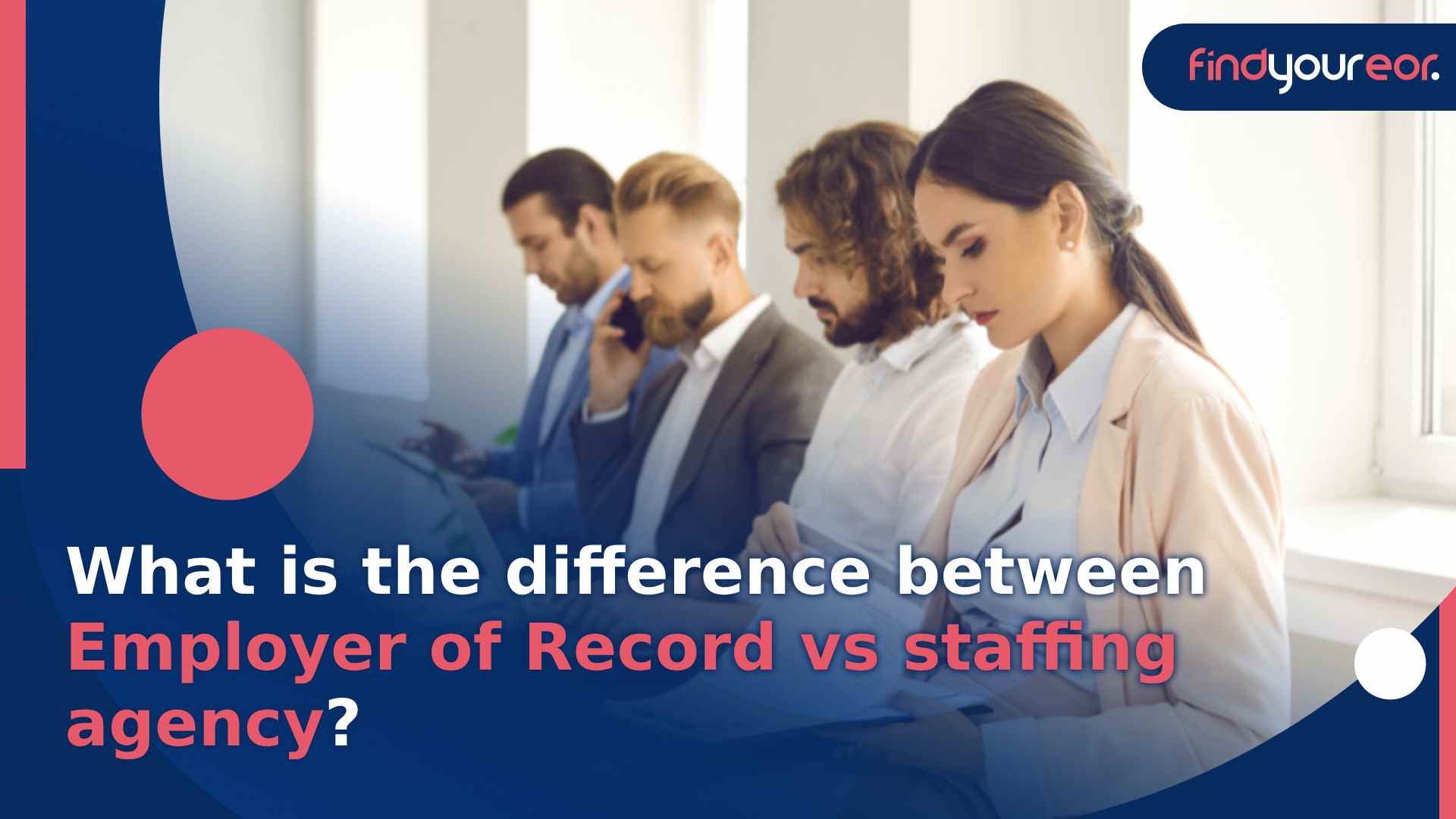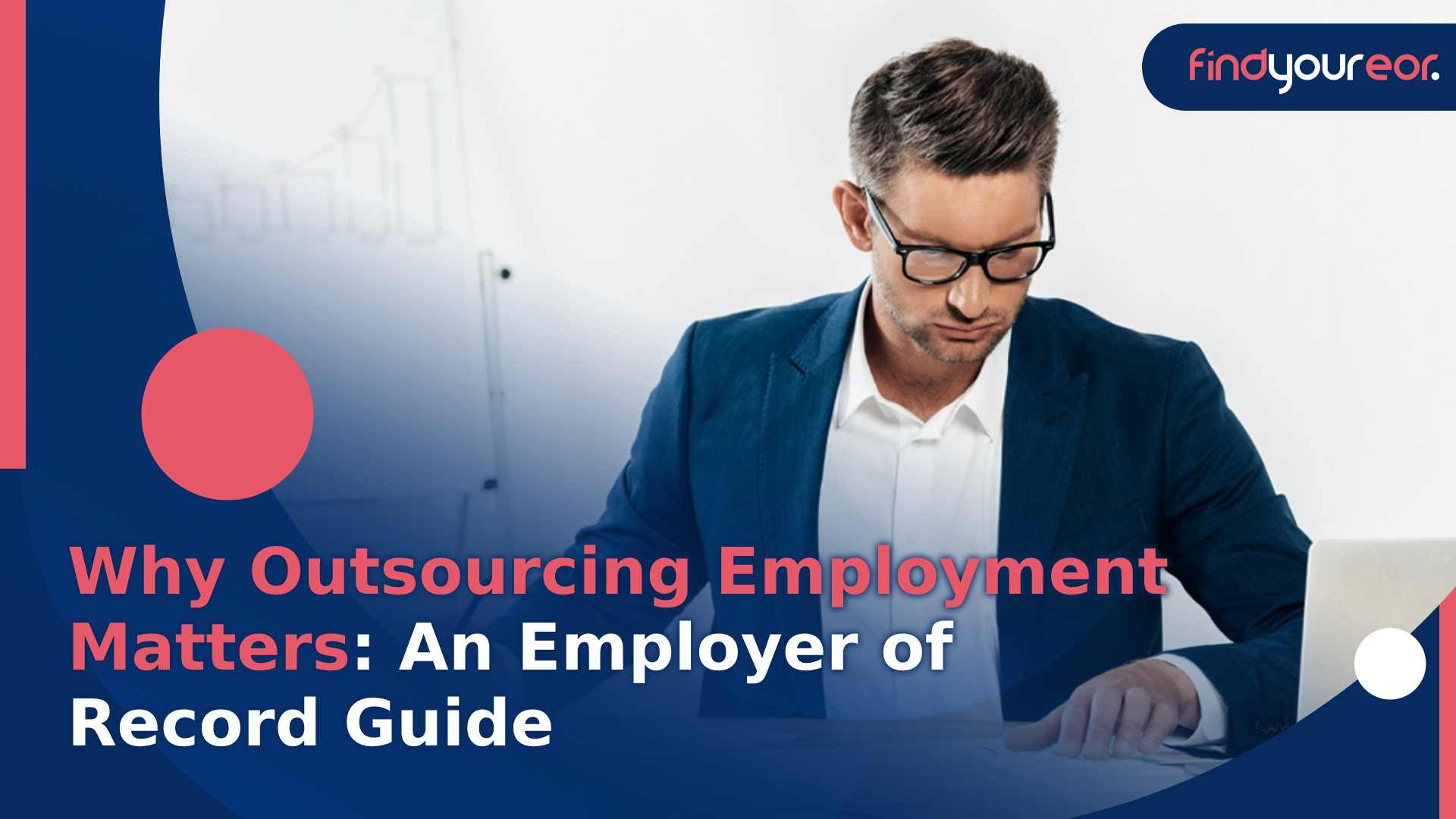Why Outsourcing Employment Matters: An Employer of Record Guide
Last update: October 11th 2023
Outsourcing is a common trend in today's competitive job market, with many employers looking for ways to maximize their resources and streamline their operations. It is important for employers to understand the benefits and risks associated with outsourcing employment, so they can make informed decisions about how to use this practice.
In this article, you will understand the concept of outsourcing employment and provides an overview of why it matters to employers. It explains the advantages of outsourcing, such as cost savings, access to a larger pool of talent, and the ability to focus on core business functions. It also outlines some of the challenges associated with outsourcing, such as compliance issues, lack of control, and cultural differences.
What does Outsourcing Employment mean?
Outsourcing employment is the process of hiring people outside of your own organization to perform certain tasks or roles. This could include anything from customer service to software development. The use of outsourcing is becoming increasingly popular with businesses as it provides access to an expanded pool of talent, cost savings, and increased efficiency.
Outsourcing employment may be beneficial for companies who do not have the resources or personnel to hire full-time employees. This can include hiring a freelancer or a remote team to complete a specific project or job. This allows companies to access talented people from different parts of the world, giving them access to a range of skills and abilities that may not be available locally.
Employment outsourcing can also be a cost-effective way to manage certain tasks. By outsourcing specific roles, companies can save money on wages, benefits, and other associated costs. Additionally, they can also benefit from the expertise and experience that the outsourced team brings to the project.
In some cases, outsourcing employment can also provide a business with the ability to quickly scale up or down according to their needs. This can allow them to quickly respond to changes in the market or customer demands.
Outsourcing employment can also help improve the efficiency of a business. By working with a team of experts, companies can make sure that tasks are completed quickly and accurately. This can result in higher quality output and an improved customer experience.
The Importance of Outsourcing Employment
Outsourcing employment is becoming increasingly popular in businesses around the world. It is a strategy that can be used to gain access to specialized skills and resources while reducing labor costs and increasing the efficiency of operations. Outsourcing is also a great way to gain access to a wider talent pool of potential employees, which is especially valuable in today’s global economy.
Likewise, outsourcing employment can reduce costs for businesses in several ways. Companies can take advantage of lower labor costs, as they can hire workers from other countries where wages are much lower than in their own. Outsourcing also saves companies money on training and maintenance costs. As the outsourced employees are already trained and experienced, there is no need to invest in expensive training and upkeep.
Outsourcing can also help businesses increase efficiency. By engaging in outsourced employment, businesses can gain access to highly skilled professionals who can help them complete tasks faster and more accurately. This can lead to more efficient processes and a better overall customer experience.
Finally, outsourcing employment can help businesses gain access to a wider talent pool. This allows them to find the best and most qualified workers from any part of the world. This can be especially beneficial for companies that need highly specialized skills and resources.
The Benefits of Outsourcing Employment
• Cost savings. Companies can save money on payroll costs and other associated costs by outsourcing employment.
• Access to specialist skills. Outsourcing can provide companies with access to specialist skills and expertise that they may not have in-house.
• Increased flexibility. Outsourcing can provide companies with increased flexibility in terms of staffing levels, allowing them to quickly scale up or down depending on their needs.
• Improved efficiency. Companies can benefit from improved efficiency when outsourcing employment. As they can focus on core activities and have non-core activities taken care of by an external company.
• Reduced risk. Outsourcing employment can help to reduce the risk associated with hiring employees. As the outsourcing company takes responsibility for employment law compliance and other legal and regulatory requirements.
• Wealth of experience. Outsourcing can provide companies with a wealth of experience and knowledge from the outsourcing company.
The Challenges of Outsourcing Employment for 2024
Outsourcing is an increasingly popular business strategy that involves the contracting of services or labor to an outside company or individual. While it can help save money and improve efficiency, there are a number of potential challenges that businesses should consider before outsourcing in 2024.
First, it Is important to consider the cost of outsourcing. While it may initially seem like a cost-saving measure, there may be hidden costs associated with outsourcing that add up over time. For example, there may be additional costs associated with training and maintaining the outsourced employees. As well as the cost of making sure the outsourced employees have the necessary skills to do the job correctly. Furthermore, there may be unforeseen delays in receiving the services or labor from the outsourced company.
Second, businesses should consider the cultural implications of outsourcing. While outsourcing can help businesses stay competitive in a global market, it can also create issues with communication and collaboration. Without a shared language and culture, it can be difficult for an outsourced team to effectively work together. Additionally, businesses should be aware of any laws or regulations that may be applicable to their outsourced workers. Such as labor laws and minimum wage requirements.
Lastly, businesses should consider how outsourcing impacts their internal workforce. Outsourcing can reduce the need for some positions, causing employees to lose their jobs. This can lead to a decrease in morale and productivity. As well as a strain on the company’s relationship with its employees. Moreover, some positions that are outsourced may require specialized skills or knowledge. Thus, making it difficult for internal employees to fill these positions.
How an Employer of Record Can Help to outsource your employment?
Outsourcing certain aspects of your business can be a great way to save time and money, and an Employer of Record (EOR) is one way to do this. An EOR is a service that enables employers to outsource certain aspects of their employment responsibilities, such as payroll and benefits administration.
An EOR can help to outsource your employment by taking care of your payroll and benefits administration needs. The EOR will take on the role of employer, so they are responsible for the payroll and employee benefits administration. This allows employers to focus on their core business operations without having to manage payroll and employee benefits.
An EOR can also help to outsource other aspects of employee management, such as recruitment and onboarding. An EOR can help manage the recruitment and selection process, ensuring that only the most qualified and suitable candidates are chosen for vacant positions. They can also handle the onboarding process, making sure that new employees receive the necessary training and get up to speed quickly.
In addition, an EOR can help to outsource certain aspects of employee management, such as performance reviews and disciplinary proceedings. An EOR can help to ensure that employees are accountable for their performance. And that disciplinary proceedings are conducted in a fair and impartial manner.
How to Choose the Right Employer of Record
Choosing the right Employer of Record (EOR) is an important decision for businesses that need to expand into new international markets. An EOR can help manage the complexities of payroll, tax, and legal compliance in a foreign country. However, it is important to pick the right one. Here are some tips for choosing the right EOR.
1. Research and Compare. Start by researching potential EORs and comparing their services, experience, and rates. Look for an EOR that is knowledgeable about the local laws and regulations in the country you are expanding to.
2. Check References. Ask each EOR for references from past clients and contact them to get their feedback. This can help you determine which EOR is the best fit for your needs.
3. Consider Cost. Every business has a budget, and it is important to consider the cost of the EOR before making a decision. Make sure to compare the rates of various EORs to ensure you are getting the best value for your money.
4. Ask Questions. Before making a final decision, make sure to ask questions about the EOR’s services, experience, and processes. This will help you understand the company and make sure they are the right fit for your business.
Choosing the right Employer of Record is an important decision for businesses that need to expand into new international markets. By researching potential EORs, checking references, considering cost, and asking questions, you can make sure you are selecting the right one for your business.
Getting Started with an Employer of Record
Getting started with an Employer of Record (EOR) is a great way to manage your employees and expand your business. An EOR is a third-party company that acts as the employer for your employees, providing payroll, benefits, and other employer-related services. This allows you to manage your employees without having to deal with the complexities of being an employer.
The first step to getting started with an EOR is to find an EOR provider that fits your needs. You should look for a provider that is reputable, has a good track record, and offers the services you need. It is also important to find a provider that is familiar with the laws and regulations in your area. As this will help you avoid any compliance issues.
Once you have chosen an EOR provider, you should discuss your needs and expectations with them. This will help them understand the requirements for your business and will help ensure that they provide the services you need.
Next, you will need to decide which services you would like the EOR to provide. This could include payroll services, benefits administration, employment verification, and more. Once you have chosen the services you would like, you can then negotiate the terms of the agreement with the EOR.
Finally, you will need to sign a contract with the EOR. This contract will outline the services the EOR will provide, the cost for those services, and the timeframes for those services. It is important to read and understand the contract before signing it. As this will ensure that you understand what you are agreeing to.
Small Employer of Record guide for helping your business
Employer of Record (EOR) is a popular service ideal for businesses to help them manage their hiring and payroll processes. The EOR service provides a comprehensive solution that helps companies to streamline their hiring process, pay their employees accurately, and reduce their compliance risks in a global environment.
The EOR service provides a range of services to help businesses manage their payroll and employment practices. It can help businesses comply with local tax laws and regulations, maintain employee records, and track employee hours accurately. The EOR service can also help companies comply with labor laws, such as the minimum wage and overtime rules, and ensure that their employees are treated fairly.
The EOR service can also help businesses manage their global payroll operations. It can provide assistance in setting up employee payroll accounts, managing tax withholdings, and managing exchange rates for international payrolls. The EOR service can also provide assistance with filing reports with the local government and providing the necessary documents for employee onboarding.
The EOR service can also help businesses manage their employee benefits, such as health insurance and retirement plans. An EOR service can help businesses understand the different types of benefits offered by their employers. As well as providing guidance for enrolling employees in these benefits. It can also provide assistance with setting up employee vacation and sick leave policies, as well as helping to calculate employee pay stubs.
The EOR service can help businesses comply with local laws and regulations, maintain accurate employee records, and manage their global payroll operations. The EOR service can also provide assistance with setting up employee benefits and managing employee vacation and sick leave policies. In addition, the EOR service can help businesses understand their obligations and protect their employees from unfair labor practices.












